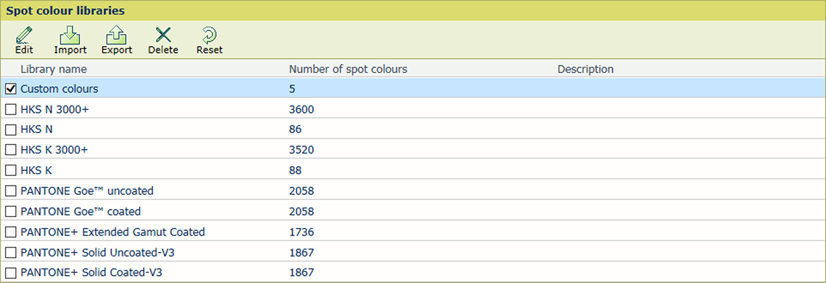

Spot colours realise a consistent colour and are often used in logos and house style colours. PRISMAsync Print Server provides a spot colour editor which contains a set of pre-defined spot colour libraries, such as PANTONE libraries and HKS libraries. The library of custom spot colours contains the spot colours that users have created. The spot colour configuration is offered in the Settings Editor and on the control panel. Spot colour libraries can only be managed from the Settings Editor.
If a print document contains a spot colour the printer needs to know how to simulate that particular spot colour for accurate colour matching. Because ink behaves differently on different types of media, you can add CMYK colour values for a media family / halftone combination.
 Spot colour libraries
Spot colour librariesThe PRISMAsync Print Server Settings Editor offers a function to import other spot colour libraries, named named colour profiles. A named colour profile has a standardised file format defined by the ICC (International Color Consortium). It contains a list of spot colours names with their Lab values.
PRISMAsync Print Server provides a set of pre-defined spot colour libraries, such as PANTONE libraries and HKS libraries. The library of custom spot colours contains the spot colours that users have created. The spot colour configuration is offered in the Settings Editor and on the control panel. Spot colour libraries can only be managed from the Settings Editor.
There are three types of spot colour libraries:
Custom spot colours
Imported spot colours
Pre-defined spot colours
|
When you want to |
Solution |
|---|---|
|
Go to the spot colour libraries |
|
|
Import a spot colour library (Named spot colour profiles) |
|
|
Export a spot colour library |
You can only export previously imported named spot colour profiles.
|
|
Edit a spot colour library |
You can only edit the name and description of previously imported named spot colour profiles.
|
|
Delete a spot colour library |
You can only delete previously imported named spot colour profiles.
|
|
Reset a spot colour library |
You can only recover the contents of a pre-defined and previously imported named spot colour profiles. The original spot colour values are restored.
|
|
When you want to |
Solution |
|---|---|
|
Go to the spot colours |
|
|
Search a spot colour |
|
|
Add a spot colour |
A spot colour is the combination of a spot colour name, the defined Lab value and a tint value.
|
|
Copy a spot colour |
You can add a custom spot colour by copying an existing spot colour from one of the spot colour libraries. You can edit the name but not the Lab values.
|
|
Edit a spot colour |
|
|
Delete a spot colour |
You can only delete custom spot colours.
Edit the spot colour to delete CMYK values for a media family / halftone combination. |
|
Restore the original values of a spot colour |
You can only recover the values of spot colours of the pre-defined libraries and previously imported named spot colour profiles.
|
Spot colours realise a consistent colour and are often used in logos and house style colours. The CMYK value for the 100% tint of a spot colour for the different media family / halftone combinations is always derived from the Lab value of a spot colour, except for the media family / halftone combination for which the CMYK value was explicitly defined. When you change the individual CMYK values, the initial Lab value of the spot colour remains unchanged.
If a print document contains a spot colour the printer needs to know how to simulate that particular spot colour for accurate colour matching. Because ink behaves differently on different types of media, you can add CMYK colour values for a media family / halftone combination.
|
Spot colour attributes |
Description |
|---|---|
|
[Name] |
Enter a unique name according to naming conventions. |
|
[Colour] |
The [Old] colour patch is the initial colour. The [New] colour patch shows the colour of an added CMYK value for another media family / halftone combination. |
|
[Input mode] |
Lab: When a new colour has been measured with a spectrophotometer it is easy to enter its Lab values. For fine-tuning you can specify the spot colour values in CMYK. CMYK values are specified in percentages (0-100%, with step size of 1%). CMYK: When you define the CMYK values, you indicate the initial media family / halftone combination for correct interpretation of the CMYK values. |
|
[Tint] |
When a new custom colour is defined, the colour value (Lab or CMYK) for the 100% tint value of the spot colour is specified. You can define CMYK values for tint values below 100%. |
|
[Media family] / [Halftone] |
When a custom spot colour is created in Lab values initial CMYK values are calculated for a default media family / halftone combination for correct interpretation of the CMYK values. This media family / halftone combination is referred to as the initial media family / halftone combination. Add more CMYK values for other combinations. |
|
[Step size] |
The chosen step size determines the degree of patch variations. This step size is a percentages (1 - 20). |
|
[Print patch chart] |
Print a patch chart to fine-tune CMYK values or check the printed spot colour. |
|
[Add CMYK value] |
You can add CMYK values of a spot colour for other media family / halftone combinations.
|